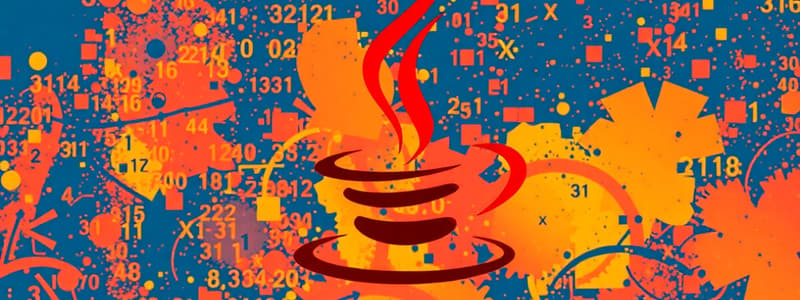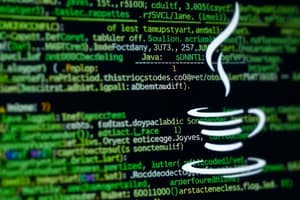Podcast
Questions and Answers
What is the primary purpose of Java Standard Edition (Java SE)?
What is the primary purpose of Java Standard Edition (Java SE)?
- To offer APIs for fundamental Java features like security and networking (correct)
- To provide advanced features for enterprise applications
- To serve as a foundation for mobile and embedded device applications
- To enable the development of rich online applications
Which Java edition is specifically designed for mobile and embedded device applications?
Which Java edition is specifically designed for mobile and embedded device applications?
- Java Standard Edition (Java SE)
- JavaFX
- Java Micro Edition (Java ME) (correct)
- Java Enterprise Edition (Java EE)
What distinguishes Java Enterprise Edition (Java EE) from Java Standard Edition (Java SE)?
What distinguishes Java Enterprise Edition (Java EE) from Java Standard Edition (Java SE)?
- Java SE is tailored for mobile applications.
- Java EE adds specifications for commercial application features. (correct)
- Java ME provides basic security features.
- Java EE includes rich online application features.
Which of the following platforms uses a simple API for the development of rich online applications?
Which of the following platforms uses a simple API for the development of rich online applications?
What is a key characteristic of the Java Standard Edition (Java SE)?
What is a key characteristic of the Java Standard Edition (Java SE)?
What happens when no access modifier is specified for a class or member in Java?
What happens when no access modifier is specified for a class or member in Java?
How does the private access modifier affect method accessibility in Java?
How does the private access modifier affect method accessibility in Java?
In which scenarios can methods or data members declared as protected be accessed?
In which scenarios can methods or data members declared as protected be accessed?
What does the public access modifier allow in Java?
What does the public access modifier allow in Java?
What is dynamic binding in Java, and why is it important?
What is dynamic binding in Java, and why is it important?
How does an object-oriented program facilitate communication among objects?
How does an object-oriented program facilitate communication among objects?
What role does polymorphism play in dynamic binding?
What role does polymorphism play in dynamic binding?
Why is it important to understand access modifiers in Java?
Why is it important to understand access modifiers in Java?
What are the key features that make Java an object-oriented programming language?
What are the key features that make Java an object-oriented programming language?
How does Java ensure its platform independence?
How does Java ensure its platform independence?
What distinguishes Java from C++ in terms of memory management?
What distinguishes Java from C++ in terms of memory management?
Can you list the types of arrays in Java and provide an example of each?
Can you list the types of arrays in Java and provide an example of each?
What is the role of the Java Development Kit (JDK)?
What is the role of the Java Development Kit (JDK)?
Explain the importance of the 'main' method in a Java program.
Explain the importance of the 'main' method in a Java program.
What are the advantages of using encapsulation in Java?
What are the advantages of using encapsulation in Java?
How does Java's multithreading feature benefit application development?
How does Java's multithreading feature benefit application development?
How does the Java Virtual Machine (JVM) interact with Java bytecode?
How does the Java Virtual Machine (JVM) interact with Java bytecode?
What roles do the Java API packages serve in the Java programming environment?
What roles do the Java API packages serve in the Java programming environment?
In what ways does Java Enterprise Edition (Java EE) enhance Java Standard Edition (Java SE)?
In what ways does Java Enterprise Edition (Java EE) enhance Java Standard Edition (Java SE)?
What is the significance of the java.applet package in Java programming?
What is the significance of the java.applet package in Java programming?
Can you explain the fundamental difference between Java SE and Java ME?
Can you explain the fundamental difference between Java SE and Java ME?
What are some functionalities provided by the java.util package?
What are some functionalities provided by the java.util package?
How does the Java compiler play a role in the execution of Java programs?
How does the Java compiler play a role in the execution of Java programs?
What is meant by the term 'platform independence' in the context of Java?
What is meant by the term 'platform independence' in the context of Java?
What is the purpose of documentation comments in Java?
What is the purpose of documentation comments in Java?
Why is the package declaration optional in Java?
Why is the package declaration optional in Java?
Explain the role of import statements in Java.
Explain the role of import statements in Java.
What is an interface in Java, and how is it defined?
What is an interface in Java, and how is it defined?
Why is the class definition mandatory in a Java program?
Why is the class definition mandatory in a Java program?
What is the significance of the main method in a Java program?
What is the significance of the main method in a Java program?
What does it mean when the main method is declared as 'static'?
What does it mean when the main method is declared as 'static'?
Define tokens in the context of a Java program.
Define tokens in the context of a Java program.
How does memory management differ between C++ and Java?
How does memory management differ between C++ and Java?
What is the implication of C++ being platform-dependent compared to Java?
What is the implication of C++ being platform-dependent compared to Java?
Identify and define the three types of comments used in Java.
Identify and define the three types of comments used in Java.
What are the typical components of a Java program?
What are the typical components of a Java program?
What role do comments play in programming?
What role do comments play in programming?
What could be a consequence in C++ if memory is not properly managed?
What could be a consequence in C++ if memory is not properly managed?
Explain how Java's garbage collection benefits developers.
Explain how Java's garbage collection benefits developers.
In what situations might a developer prefer C++ over Java?
In what situations might a developer prefer C++ over Java?
Flashcards are hidden until you start studying
Study Notes
Java Standard Edition (Java SE)
- Provides core APIs essential for Java programming, covering fundamental features.
- Key functionalities include security protocols, networking capabilities, and graphical user interface (GUI) development tools.
Java Enterprise Edition (Java EE)
- Built on top of Java SE, designed for enterprise-level applications.
- Introduces specifications to support commonly needed features in large-scale, commercial software solutions.
Java Micro Edition (Java ME)
- Aimed at mobile and embedded devices, tailored to resource-constrained environments.
- Facilitates the development of applications intended for a variety of small devices including mobile phones and embedded systems.
JavaFX Platform
- Uses a streamlined API to enable the creation of rich internet applications (RIAs).
- Supports modern user interface development with advanced graphics and media capabilities.
Introduction to Java
- Java, developed by Sun Microsystems in 1995, is a prominent object-oriented programming language.
- Uses of Java include Android development, web applications, artificial intelligence, and cloud computing.
Features of Java
- Simple: Easy syntax and strong memory management minimize bugs.
- Object-Oriented: Supports OOP principles, including classes, inheritance, abstraction, encapsulation, and polymorphism.
- Portable: Java bytecode enables running on multiple computer systems regardless of OS.
- Platform Independent: Follows the principle of "Write Once, Run Anywhere" (WORA).
- Secured: JVM monitors execution for security, making it ideal for internet applications.
- Robust: Automatic garbage collection enhances memory management.
- Architecture Neutral: Compiled bytecode can run on different architectures.
- Multithreaded: Supports concurrent execution of tasks.
- Dynamic: Can adapt dynamically to changing conditions.
Java Platforms
- Java SE (Standard Edition): Fundamental features, UI, and networking.
- Java EE (Enterprise Edition): Built upon Java SE, adds specifications for commercial applications.
- Java ME (Micro Edition): Designed for mobile and embedded applications.
- Java FX: Simplified development of rich online applications.
Java Virtual Machine (JVM) and Java API
- JVM: Executes Java bytecode; translates Java source code into intermediate byte code.
- Java API: Collection of classes and methods; organized in packages for functionality.
Java Data Types and Control Flow
- Distinction between primitive and reference types.
- Uses variables, operators, and specific naming conventions.
- Decision-making via
ifandswitch, looping withforandwhile. - Type Casting: Converting one data type to another for operations.
- Arrays: Supports one-dimensional and two-dimensional arrays.
Access Modifiers in Java
- Default: No keyword needed; accessible within the same package.
- Private: Only accessible within the class itself.
- Protected: Accessible within the same package and subclasses.
- Public: Accessible from anywhere in the program.
Structure of a Java Program
- Documentation Section: Enhances readability with comments, includes single-line, multi-line and documentation comments.
- Package Declaration: Specifies the package name where class belongs.
- Import Statements: Allows the use of built-in API packages; more than one package can be imported.
- Interface Section: Optional; contains method declarations without implementation.
- Class Definition: Mandatory; Java programs must be encapsulated in classes.
- Main Method: Entry point of execution defined by
public static void main(String args[]).
Key Differences Between C++ and Java
- Memory Management: Java uses automatic garbage collection, while C++ requires manual management leading to potential memory leaks.
- Platform Dependence: Java is platform-independent thanks to bytecode; C++ is platform-dependent on the targeted machine.
Tokens and Keywords
- Tokens: Smallest individual units in a Java program, such as separators, keywords, and operators.
- Keywords: Predefined words with specific meanings in Java, totaling 52 distinct keywords.
Studying That Suits You
Use AI to generate personalized quizzes and flashcards to suit your learning preferences.




